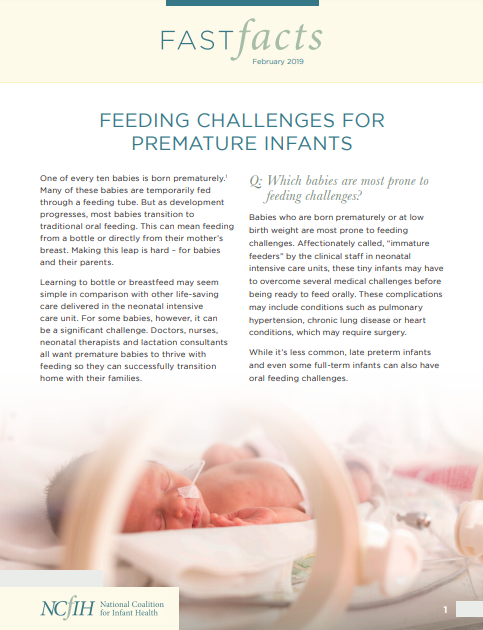 Prematurity causes tiny babies to spend days or weeks, sometimes months, in neonatal intensive care. But a new “Fast Facts” highlights one challenge that often keeps them there when they are otherwise ready to go home: feeding.
Prematurity causes tiny babies to spend days or weeks, sometimes months, in neonatal intensive care. But a new “Fast Facts” highlights one challenge that often keeps them there when they are otherwise ready to go home: feeding.
“Learning to bottle or breastfeed may seem simple,” the paper explains. “For some babies, however, it can be a significant challenge.”
Causes of Oral Feeding Challenges
Premature and low birth weight babies are most at risk for being “immature feeders” because their body systems simply aren’t ready for the task yet. Babies’ brain development, for example, may not be mature enough to successfully time sucking, swallowing and breathing.
They may also lack muscle tone and strength, or adequate lung capacity. And some babies may develop negative sensory experiences from repetitive tubes or suctioning of their nose and mouth, creating an aversion to feeding.
Support from Parents and Hospital Leadership
The “Fast Facts” describes how parents’ presence and engagement with their baby in the hospital has “a significant impact on feeding readiness and success.” Doctors, nurses, neonatal therapists and lactation consultants can help parents become expert feeders of their baby. Hospital staff may also offer babies a pacifier or provide human touch during tube feeding, both tactics that can increase oral feeding readiness.
Hospital leadership and parents alike should seek resources that enable parents to be present for as many feedings as possible. This can include care for other children who may not be allowed in the NICU and reliable transportation.
Impacts of Delayed Feeding from Breast or Bottle
When a baby does finally graduate to oral feeding, that doesn’t necessarily mean he or she is proficient enough to attend mainstream childcare settings like daycare, or a church or gym nursery. Such limitations can cause strain on parents and other family members.
The “Fast Facts” also notes that, while some babies have no long-term issues from their feeding delays, others’ challenges extend into childhood, when they can stunt growth or development.
Prolonged hospitalization for babies with feeding challenges has implications for babies, parents and the health care system. But, with the right support, babies will increase in maturity and thrive with feeding.
To learn more, read “Fast Facts: Feeling Delays in Premature Infants.”

